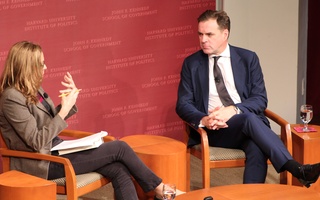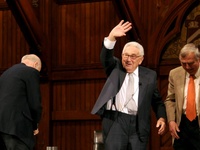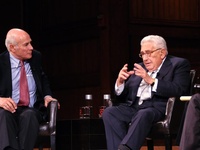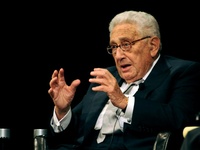
Dr. Henry Kissinger speaks to an at-capacity crowd in Sanders Theatre. Dr. Kissinger, a world-renowned political thinker, Nobel Peace Prize winner, and Secretary of State under Presidents Reagan and Ford, discussed many topics, ranging from the political relations between the U.S. and China to his life as a Harvard student under the GI Bill.
Former Secretary of State Henry A. Kissinger ’50 returned to his alma mater Wednesday to tell stories of negotiating with China’s Mao Tse-tung and of secretly harboring a cocker spaniel, Smoky, in his Claverly dorm room. Kissinger’s speech in Sanders Theatre was part of Harvard’s year-long 375th anniversary celebration.
University President Drew G. Faust introduced Kissinger as one of “Harvard’s most legendary graduates.”
Kissinger—who served as National Security adviser and Secretary of State during the Richard M. Nixon and Gerald Ford administrations and received the 1973 Nobel Peace Prize—recalled his first two weeks at Harvard, when he slept in bunk beds in a gymnasium provided for students of the over-enrolled Class of 1950 whom the dorms could not accommodate. Kissinger was later a member of Adams House.
Kissinger established a close relationship with a tutor, William Y. Elliott, who sparked his ardent interest in Kantian ethics, a background he said was influential in his later thinking.
“In philosophy class, you deal with morality,” he said. “In statesmanship, you deal with nuances.”
Kissinger, who also received a Masters, Ph.D., and law degree from Harvard and taught at the University for 15 years, said Wednesday that although academics and political actors may examine the same issues, they do so from different vantage points.
He explained that writers and professors have a perspective informed by their ability to choose topics at their discretion and change their opinions over time.
In contrast, statesmen must act quickly and irrevocably.
Looking back on his actions as Secretary of State, Kissinger, now 89 years old, said he wonders whether he would now be a better Secretary of State.
“I don’t have a satisfactory answer,” he said.
While he believes that he now has a more balanced view of the world, he said he has lost some of the self-confidence that is necessary for the job.
“You don’t get rewarded for your doubts,” he said.
Despite Faust’s warm introduction, not all attendees were pleased that Kissinger had been invited to speak.
As Kissinger began his remarks, an audience member yelled “war criminal” and “shame on Harvard” before he was escorted out by Harvard University Police Department officers.
Outside of Sanders Theatre, several people protested Kissinger’s appearance.
Joseph F. Kebartas, a member of the nonprofit organization Veterans for Peace, said that he was protesting in an attempt to make the Harvard community aware of numerous crimes that Kissinger has committed.
“It’s hard to believe Harvard would put him up to such high esteem and invite him to speak,” Kebartas said.
However, other attendees said that they did not object to the event.
“I don’t think that there is a moral problem in inviting him to speak or that Harvard did anything wrong by doing so,” said Elvira A. M. Sihvola ’14.
—Staff writer Alyza J. Sebenius can be reached at asebenius@college.harvard.edu.
Read more in News
The Great House War of 2012 EscalatesRecommended Articles
-
ON NUCLEAR TESTINGTo the Editors of the CRIMSON: The American resumption of nuclear tests in the atmosphere poses issues which deserve the
-
Kissinger Cautions Disarmament Might Lead to U.S.S.R. VictoryHenry A. Kissinger '50, Associate Director of the Center for International Affairs, declared yesterday that "the United States must be
-
Hughes Pictures Bleak Prospects For Nuclear Race"Any honest advocate of peace and disarmament must start by saying that things have never looked worse," declared H. Stuart
-
Kissinger Aide Resigns in Protest To Recent 'Invasion' of CambodiaMorton H. Halperin. Southeast Asian specialist and a former research associate of the Center for International Affairs, resigned last week
-
 Ferguson Discusses Politics and Kissinger Biography
Ferguson Discusses Politics and Kissinger Biography
















